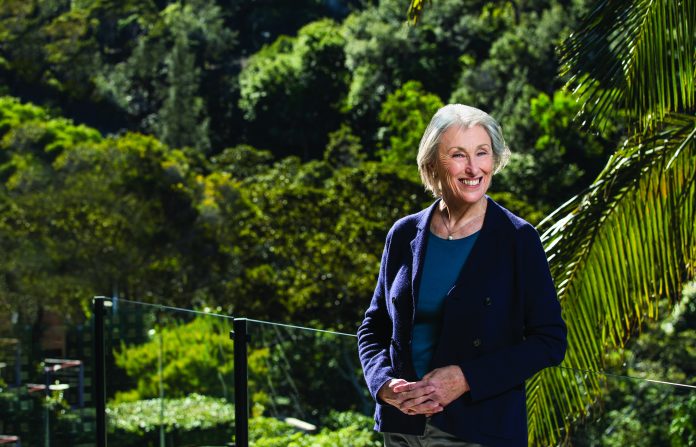Susanne Weress’s pharmacy career has taken her from Sydney to London, Singapore to Sri Lanka and Kenya to Kyrgyzstan. Bookending that incredible journey has been a dedication to rural and regional Australia, not only as a clinical and consultant pharmacist, but also as an accredited tour leader.
Tell us how the early years of your career were spent.
After Sydney University I did my registration at Prince of Wales Hospital before heading to London to work and travel. When I returned to Australia a few years later I worked as a rural locum – while deciding what I wanted to do. Now, 45 years later and at the end of my pharmacy career, I’m working as a rural and remote locum again. I’ve come full circle.
So what did you decide to do?
I didn’t exactly decide, serendipity took over. I had my children and during the early 1980s I worked in community pharmacy because there was no part-time work in hospitals.
In the 1980s my husband’s job took us to Singapore where I worked at the National University Hospital. That really piqued my interest in working in other cultures. When I returned to Australia I worked at Sydney’s Royal North Shore Hospital as a clinical pharmacist in the area’s first job-share arrangement. That lasted 15 years.
In the early 2000s, you became a locum pharmacy director in Tennant Creek. What was that like? It’s about the closest thing I can imagine to space travel. I was just so shocked at the realities of living on the driest inhabited continent on earth. I was full of admiration for people living out there, and for Aboriginal Australians, many of whom live in quite shocking circumstances.
As an Australian, if you have the opportunity to work in rural Australia, take it, especially if you can work with Aboriginal people. You get a much broader and deeper understanding of Australia, the realities of our healthcare challenges, and how extraordinarily beautiful our country is. And how important the ‘Uluru Statement From The Heart’ and the establishment of a Makarrata is to all Australians.
Later you spent time in towns like Bourke, Walgett, and Lightning Ridge delivering NPS MedicineWise’s Therapeutics Education Programs to healthcare practitioners. What kept you in that role?
This experience enabled me to develop very different relationships with GPs, nurses, Aboriginal Health Workers and pharmacists.
Another thing I really enjoyed was that I met doctors from every corner of the world. I think out of my cohort of about 150 GPs, at least 50 percent were overseas trained.
I also loved roaming the countryside. I’d hop in the car, drive from one town to the next, have a chat with people when I bought coffee. It’s one of the best jobs I’ve had.
In the meantime you were leading tours. How did that come about and why is it something you continue to do?
It was just a whim. I was working as a consultant pharmacist, writing medication review reports and heard there wouldn’t be enough tour guides for the Sydney Olympics. I thought ‘why don’t I just do something fun’. I did a TAFE course and ended up leading National Trust Tours for eight years. Outback Australia became my specialty, particularly Aboriginal history, art and culture.
I lead two or three tours a year for Abercrombie & Kent. Being a pharmacist and a tour leader are similar in many ways: they’re both about people, attention to detail, delivering information, listening, problem solving and being curious.
In 2008 you started working with Medecins Sans Frontieres (MSF) in Kenya and then Sri Lanka before being appointed to the board of MSF Australia. What did you find most satisfying about that experience?
Working with the national teams on the ground. Most are really committed to delivering better healthcare.
It was also extraordinary to learn about their way of life and the difficulties they face just surviving.
I remember in Kenya, when I was working on a large HIV and tuberculosis project, our head nurse was a local woman called Pamela. One day I asked her about her life. It transpired she was about mid 30s and two of her siblings had died from HIV, leaving her and her husband caring for 14 children – including 10 teenagers – in a two-bedroom house.
They’re the sort of people you meet and the stories you hear with MSF. They really do drive home how extraordinarily privileged we are as Australians. But also that we, as pharmacists, have transferable skills that we can use to help others.
Learn more about opportunities for pharmacists with MSF at www.msf.org.au/join-our-team/work-overseas/who-we-need/medical/pharmacists
Get more news at australianpharmacist.com.au



 John Jones MPS, pharmacist immuniser and owner of My Community Pharmacy Shortland in Newcastle, NSW[/caption]
John Jones MPS, pharmacist immuniser and owner of My Community Pharmacy Shortland in Newcastle, NSW[/caption]


 Debbie Rigby FPS explaining how to correctly use different inhaler devices[/caption]
Debbie Rigby FPS explaining how to correctly use different inhaler devices[/caption]




 Professor Sepehr Shakib[/caption]
Professor Sepehr Shakib[/caption]

 Lee McLennan MPS[/caption]
Lee McLennan MPS[/caption]
 Dr Natalie Soulsby FPS, Adv Prac Pharm[/caption]
Dr Natalie Soulsby FPS, Adv Prac Pharm[/caption]
 Joanne Gross MPS[/caption]
Joanne Gross MPS[/caption]








